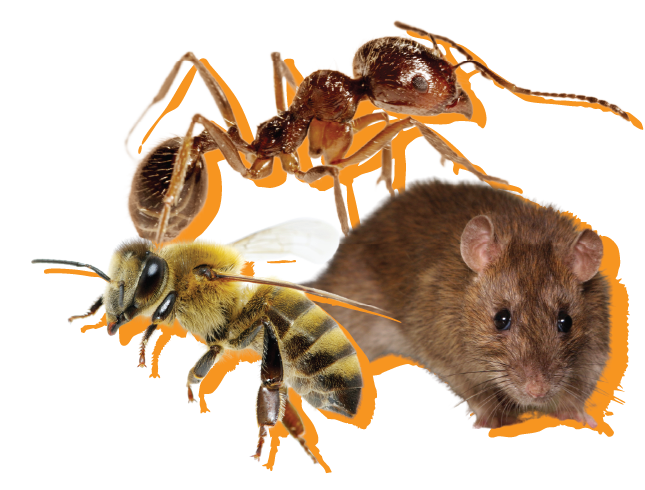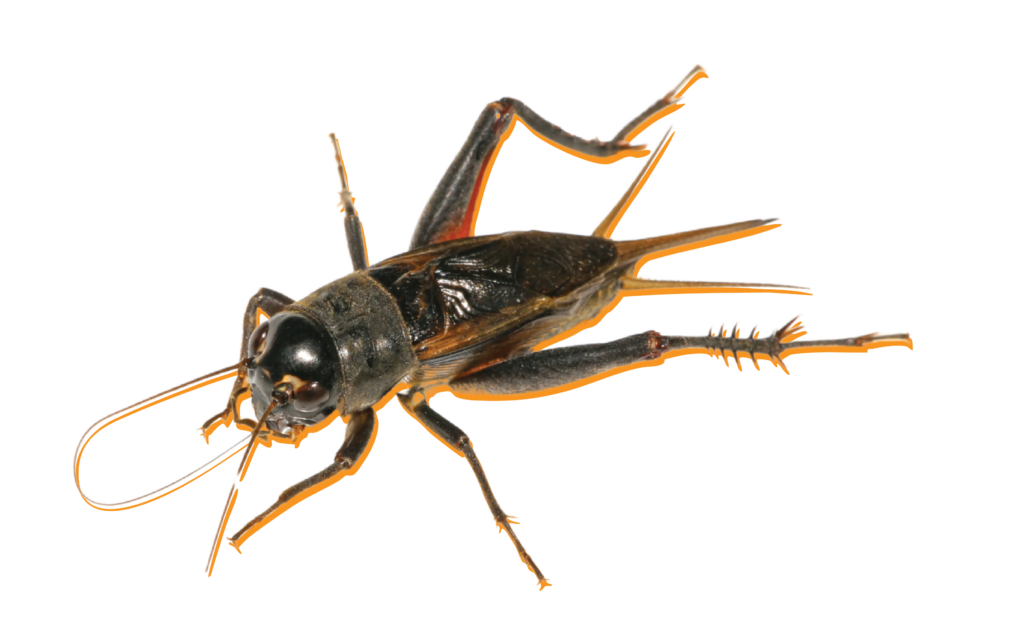Table of Contents
- Key Points
- Ants: Titans of Trouble
- Mosquitoes: An Unwelcome Buzz
- Termites: Silent Destroyers
- Spiders: Creepy Crawlers
- Ticks: Tiny Hitchhikers
- Fleas: Pet Peeves
- Find Spring Pest Control Services Near You
- References
Key Points
Ah, springtime in Greenville, South Carolina! The azaleas are blooming and the air is teeming with life. On paper, that sounds delightful, but in reality, that buzzing could be a warning of impending insect infestations.
Fortunately, there are effective ways to control and combat these threats. The first step though is identification.
This article explores some of the most common Greenville, SC, spring insects that emerge from winter dormancy. Keep reading to learn what signs to look for, how to ID common spring pests, and the most effective ways of preventing and addressing those that aim to make their way into your home.
1. Ants: Titans of Trouble
- Details: Greenville sees a surge in ant activity during spring, particularly pavement ants, Argentine ants, and odorous house ants. They are drawn to food crumbs, sugary substances, and moisture. Ants create trails to food sources, establishing colonies both indoors and out.
- Problems: Ants can contaminate food, are unsightly, and their bites can be irritating. Some species can even cause structural damage.
- Control Methods:
- Prevention: Eliminating things that lure ants into the building in the first place is one of the most effective control methods. Be sure to keep kitchen surfaces clean and free of food prep or meal remnants. Promptly clean up any spills. Store food—including dry goods—in airtight containers.
- Barrier Sprays: Apply insecticidal sprays around the perimeter of your home and along ant trails.
- Bait Stations: Ant bait stations are plastic structures that contain slow-acting insecticides. Worker ants carry the bait back to the colony, which has the potential to eliminate the queen, along with other ants.
- Natural Remedies: Food-grade diatomaceous earth sprinkled around ant trails can dehydrate and kill ants.
- Professional Help: For large infestations or persistent ant problems, consider contacting a professional pest control service. They will know what combination of treatments will be most effective based on your unique circumstances.
2. Mosquitoes: An Unwelcome Buzz
- Details: Greenville’s humid climate and abundant standing water sources create ideal breeding grounds for mosquitoes. Spring rains and rising temperatures add fuel to this flame, leading to a rapid increase in mosquito populations.
- Problems: Mosquitoes are notorious for their itchy bites and, more importantly, their ability to transmit diseases—approximately a dozen different ones, according to the U.S. Centers for Disease Control and Prevention. Some of the more serious ones include West Nile and Zika viruses.1
- Control Methods:
- Prevention: Eliminating standing water is one of the best ways to dissuade mosquitoes from lurking about. Pay special attention to stagnant water that accumulates from or around gutters, flowerpots, bird baths, and other containers.
- Mosquito Repellent: Applying an EPA-approved mosquito repellent containing DEET, picaridin, or lemon eucalyptus oil, can be an effective way to keep mosquitoes off your person.
- Install Mosquito Barriers: Worldwide, mosquito netting is used as one of the most effective ways to prevent mosquito bites and, consequently, mosquito-borne diseases.2 While it may not feasible (or necessary) to install mosquito netting over individual beds, you can implement this basic concept in the form of screens. Consider installing screen doors or screening in outdoor living areas, like decks or patios, to help keep mosquitoes out.
- Citronella Candles: While not foolproof, citronella candles can offer some localized protection against mosquitoes. They actually work by masking the scents that mosquitoes are attracted to, such as chemicals that humans emit.
- Encourage Natural Predators: Bats and dragonflies are natural predators of mosquitoes. Bat houses can provide a safe shelter that encourages roosting in the area. Tall grasses, reeds, or other vertical plants—especially native ones—provide perches for dragonflies.
- Yard Treatments: Setting up professional mosquito yard treatments is one of the most aggressive approaches, but it is effective. These usually include some combination of pesticides that kill adult mosquitoes and those that attack larvae. Professional technicians can also recommend specific preventative measures, such as barriers or landscape management tactics to reduce mosquito habitats.
3. Termites: Silent Destroyers

- Details: Termites can be active all year long, but they are one of the main bugs that come out in the spring in Greenville. Subterranean termites, the most common type, emerge from their colonies to mate and establish new colonies. This makes homes particularly susceptible to termite infiltration during this time of year.
- Problems: Termites cause extensive damage to wooden structures, often going undetected for years. In fact, these pests cause more than $5 billion in property damage in the United States every year.3 Unfortunately, this is often not covered by homeowners insurance plans.
- Control Methods:
- Regular Inspections: Annual termite inspections by a certified pest control professional are the most important line of defense against these pests. Reputable companies include insurance plans that give you the peace of mind that, should existing termite problems go undetected, you will be compensated for any resulting damage.
- Soil Treatments: There are two types of soil treatments you can use against termites. One type repels the pests from the building. The other kind is undetectable by termites. As they pass through, they pick up termiticides that they then transport back to the colony.
- Bait Systems: Another tactic is to install termite bait stations around your property to eliminate colonies.
- Moisture Control: It does not hurt to include some preventative measures against termites. Like all living things, termites need water to survive. Repairing leaky pipes and ensuring proper drainage around your house, for instance, can prevent moisture buildup around your foundation.
- Wood Treatment: Likewise, repair or replace rotten wood in your home. It is especially enticing to termites, as it provides them with water. Also, consider treating all exposed wood around your home with termiticides.
- Professional Help: Regardless of the approach, DIY termite treatments are not recommended, since termite control requires specialized knowledge and equipment. A professional termite inspector can make recommendations based on your unique home, property, and potential for termite infestation.
4. Spiders: Creepy Crawlers
- Details: Greenville sees an increase in spider activity during spring as they emerge from overwintering sites to mate and hunt. This also makes them more aggressive than normal. Common species include wolf, brown recluse (less common but present), and black widow spiders.
- Problems: While most spiders are harmless and even beneficial, some species, like brown recluses and black widows, have potent venom that can cause severe pain and muscle cramps, as well as more serious symptoms, like dizziness, nausea, and vomiting.
- Control Methods:
- Reduce Clutter: Eliminating clutter in your home or garage, which provides hiding places for spiders, is one of the easiest and most effective ways to keep annoying arachnids away.
- Seal Cracks and Crevices: Similarly, sealing any openings in your home’s foundation, walls, and windows can prevent spiders from entering.
- Use Sticky Traps: Sticky traps are inexpensive, easy-to-use contraptions to deploy in areas where you’ve seen spiders.
- Vacuum Regularly: Vacuuming thoroughly is one of the most effective ways to remove spiders as well as egg sacs they may have left behind.
- Limit Outdoor Lighting: Outdoor lighting attracts insects that spiders feed on. Reducing it—especially light near entryways to your home—can help limit cut down on spiders looking for prey.
- Line Up Professional Help: For large infestations or concerns about venomous spiders, contact a pest control professional. They will have suggestions on both mitigation techniques and ways to prevent spiders from returning.
5. Ticks: Tiny Hitchhikers
- Details: Ticks—particularly deer ticks and lone star ticks—become active in Greenville during spring. They thrive in wooded areas and tall grasses. Contrary to popular belief, ticks do not fly or jump, but cling to vegetation, waiting for an animal or person to brush past.
- Problems: Ticks can transmit diseases like Lyme disease, Rocky Mountain spotted fever, and ehrlichiosis.4
- Control Methods:
- Wear Protective Clothing: Wear long pants and sleeves, and tuck your pants into your socks, when working in your yard, especially in wooded areas.
- Use Tick Repellent: Like with mosquitoes, using EPA-registered tick repellent containing DEET or permethrin can help keep them from clinging to your clothes or person.
- Check for Ticks: Thoroughly checking yourself, your children, and your pets for ticks after spending time outdoors is another preventive measure you can take.
- Maintain Your Yard: Keep your lawn mowed and remove brush and debris, which ticks use as habitat.
- Pet Medications: To keep ticks from attaching themselves to your pets, you can get veterinarian-prescribed tick medications.
- Professional Tick Treatments: If you have persistent or recurring issues with ticks, or just want to nip the issue in the bud, consider professional tick treatments for your yard. These can eliminate existing threats and keep new ticks from moving into the area.
6. Fleas: Pet Peeves
- Details: Fleas thrive in warm, humid environments, making Greenville a prime location for them in the spring and into the summer. They are almost always brought into the home via pets.

- Problems: Flea bites are irritating and can be a major discomfort for pets. Fleas can transmit parasites, like tapeworms, as well as bacterial diseases, like typhus.5 They can also cause allergic reactions.
- Control Methods:
- Pet Treatments: One of the most effective things you can do to minimize the threat of fleas is to give pets medication prescribed by your veterinarian.
- Vacuum Thoroughly: Vacuuming carpets, rugs, and upholstery regularly can help get rid of fleas in your home.
- Wash Bedding: Wash pet bedding frequently in hot water to eliminate any fleas that have made their way inside.
- Yard Treatments: As with other pests on this list, you can treat your yard with pesticides to control fleas.
- Professional Help: For severe infestations, professional pest control may be necessary. Besides dispersing insecticides, they can identify problematic areas and make suggestions for prevention.
Find Spring Pest Control Services Near You
By staying vigilant and taking proactive measures, you can enjoy a pest-free spring in Greenville, South Carolina. Remember that, while some pest problems can be handled with DIY methods, there are situations that require professional intervention. Especially if you are confronted with large infestations, venomous pests, or persistent problems that do not respond to DIY treatments, it is time to call in the pros.
Precision Pest and Wildlife Removal provides commercial and residential pest control services in Greenville and throughout the Upstate. We are veteran- and family-owned and operated, and our team has decades of cumulative pest control experience. Contact us today to schedule treatment.
References
- “About Mosquitos in the United States,” U.S. Centers for Disease Control and Prevention, June 2024, from: https://www.cdc.gov/mosquitoes/about/about-mosquitoes-in-the-united-states.html.
- “Fighting Malaria With Long-Lasting Insecticidal Nets (LLINs),” United Nations International Children’s Emergency Fund, February 2022, from: https://www.unicef.org/supply/stories/fighting-malaria-long-lasting-insecticidal-nets-llins.
- “Five Termite Species All Homeowners Should Be Aware Of,“ Business Wire, March 2021, from: https://www.businesswire.com/news/home/20210304005703/en/Five-Termite-Species-All-Homeowners-Should-Be-Aware-Of.
- “About Ticks and Tickborne Disease,” U.S. Centers for Disease Control and Prevention, May 2024, from: https://www.cdc.gov/ticks/about/index.html.
- “Flea-Borne Typhus,” Texas Department of Health and Human Services, retrieved on March 12, 2025, from: https://www.dshs.texas.gov/notifiable-conditions/zoonosis-control/zoonosis-control-diseases-and-conditions/flea-borne-typhus.


